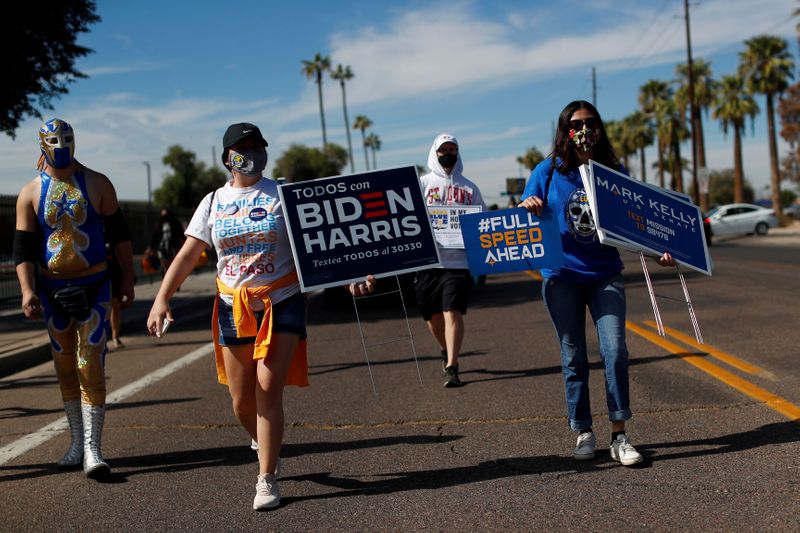By Mimi Dwyer
PHOENIX (Reuters) - When a brass band, mariachi musicians and a folk dancer wearing a dress embroidered TU VOTO CUENTA -- "your vote counts" -- paraded through her West Phoenix neighborhood, Marizol Moreno, who had never before voted in a presidential election, came outside in her pajamas to watch.
Moreno, who was born in California, had never been interested in politics. But after her husband, father and several family members got coronavirus, and enthused by the parade, she decided to go to the polls on Tuesday to vote for Democratic presidential candidate Joe Biden.
Jacqueline Jimenez, 30, said she waited in line for more than an hour to vote for Biden at City Hall in Surprise, a small city in Maricopa County.
“I wanted to be part of this year’s election,” she said. She said she had coronavirus earlier this year and President Donald Trump’s downplaying of the pandemic solidified her resolve to vote.
People like Moreno and Jiminez are exactly whom community organizers were trying to reach in the election’s final stretch in Maricopa County, which includes Phoenix and its suburbs, said Tomas Robles, co-executive director of Living United for Change in Arizona (LUCHA).
“You're engaging with someone who's never been talked to about voting,” he said, carrying a cooler at the tail end of Saturday's parade.
Results in Arizona hinge on Maricopa County, the fourth most-populous county in the nation with 4.5 million residents, including 1.4 million Hispanics.
The county voted narrowly for Trump in 2016. But its demographics and politics have shifted the past four years. Biden was leading Trump 49% to 47% in Arizona in a Reuters Ipsos poll conducted Oct. 27-Nov 1.
Arizona’s 11 electoral votes could be key to Biden’s path to victory, and Democratic strategists hope higher Latino turnout will help shift the state in his favor.
RECORD PARTICIPATION
Maricopans participated in early voting in record numbers. Before Monday, the county had processed 1.66 million ballots, surpassing the 1.6 million total cast in the 2016 election, said Megan Gilbertson, communications director for the Maricopa County Elections Department.
It won’t be clear whom those ballots were cast for until 8 p.m. on Tuesday, when the county starts posting results. But the county has inched leftward in recent years.
While Maricopa gave most of its votes to Trump in 2016, it ejected Republican Sheriff Joe Arpaio, an immigration hardliner whom Trump pardoned for ignoring a court order to stop racially profiling Latinos. The county has since helped elect people like Krysten Sinema, the first Democratic Arizona senator in three decades, to national office.
Helen Ramirez, 68, is a Democrat, but she’s also deeply religious. She voted for Trump in 2016, largely because of her views on abortion, but hates how he handled the pandemic. “There’s no compassion,” she said. She prayed until she got to the poll site, unsure of how she would vote, and then cast her ballot for Biden.
Arizona’s historically harsh treatment of immigrants and passage of legislation like SB1070, a 2010 law that codified several anti-immigrant measures, fostered strong community organizing roots that activists hope will pay off in this election.
“This is the first time that I feel like the election is actually being run by those of us who fought 10 years ago,” said Luis Avila, a longtime community activist, after wrapping up the final episode of the weekly Spanish-language call-in show about voting he has hosted on 107.5 FM La Onda.

If the state flips to support Biden, Avila said, it will be because of those grassroots efforts. “This is not a victory for Biden,” he said. “This is a victory for the communities that fought really hard to contact voters.”